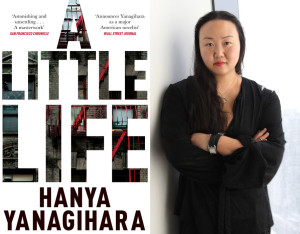 “Contracts are not just sheets of paper promising you a job, or a house, or an inheritance: in its purest, truest, broadest sense, contracts govern every realm of law. When we choose to live in a society, we choose to live under a contract, and to abide by the rules that a contract dictates for us… .” ( p.116)
“Contracts are not just sheets of paper promising you a job, or a house, or an inheritance: in its purest, truest, broadest sense, contracts govern every realm of law. When we choose to live in a society, we choose to live under a contract, and to abide by the rules that a contract dictates for us… .” ( p.116)
Hanya Yanagihara’s second novel A Little Life is a strong contender for the Man Booker Prize for Fiction 2015. It will be announced on Tuesday, 13 October 2015. Meanwhile it has created a more than a little storm in literary circles around the globe. Inevitably comments are being posted about how powerful it is, the incredible writing and not a single reader has been left unscathed, many dissolving into tears while reading it. Needless to say it rocks you emotionally. It has to be one of the most exhausting novels from contemporary literature and this is not a testimony to the time spent reading the 700-odd pages. It is the story itself. Four young men, friends from their days as undergraduates at a prestigious New England University, who try finding their feet as professionals as adults. The novel spans their lifetime but instead of it being a straightforward old-fashioned bildungsroman, it delves into their past particularly their formative years as children focusing primarily on Jude St.Francis. There is forward movement, it is hard-hitting, at times a painfully descriptive yet grippingly told narrative. It is a book that demands to be read at one-sitting ( read minimum three days) without getting distracted by anything else, otherwise it will be impossible to finish reading.
A Little Life is already being termed as a “queer classic” within a few months of its publication. It is a devastating look at adult male relationships primarily through the prism of love that the four men have for each other. The story is mapped from their days as students to old age. A time when most people have mellowed or come to terms with the life they live except for Jude who continues to be consistent in his personality –notably his physical self-flagellation whereas Hanya Yanagihara sees Jude as being “consistent in his hopefulness”. ( Hear the Guardian podcast.) If it were not for the immense love, tenderness and understanding his inner circle has for him, Jude would have long been dead. Somehow this inexplicably violent aspect of his personality overshadows his brilliance as a lawyer. Along the way other forms of love are also explored — the love between parents ( biological, foster and adopted) parents for their wards, the expression of love ( at times horrifically warped — between lovers, rapists, perpetrators of child sexual abuse) and how the bonds of love are forged over time? The factor of trust is also explored in many ways. Trust is an essential part of the foundation upon which love between two individuals is built, so should it be ever taken for granted or does it require constant nurturing?
Hanya Yanagihara is a journalist who has been with Conde Nast and New York Times. She spent a few years writing this novel. Here is an interview between her editor, Gerry Howard and her, published in Slate. ( 5 March 2015. http://www.slate.com/articles/arts/books/2015/03/hanya_yanagihara_author_of_a_little_life_and_her_editor_gerry_howard.html ) There have been a deluge of articles, reviews, interviews, podcasts with the author, coming to terms with A Little Life. It is no mean achievement when a writer is able to create a work of art that has a phenomenal reaction. Over and over again readers are responding to the manner in which it transformed them. The only consistent element evident in the media buzz about A Little Life is the astonished reaction at encountering this work of literary art. The fact that it is a work of fiction, but so magnificently detailed to make it powerfully moving and yet, as Hanya has discovered, young men have approached her saying this is remarkably true to their lives. But she clarifies in the interview with Claire Armistead that she has never known a Jude or a person who could have inspired the character. It is a novel that has created a new benchmark of literary fiction. Yet I cannot help feeling it is an example of a new form of decadence in the craft of writing. It rips apart the known “limits” of literary fiction immersing the reader in a vortex of pain, suffering, love, and relationships making it a harrowing experience but strangely addictive too — akin to the fascination upon discovering a mind blowing new art form. Even the author confirms that “this book is extravagant, its highly artificial, its large in its emotions…I want to push way up against the line almost of melodrama …and so I really wanted to push every single emotion, every single sensation as far as I could and I don’t think that is a very fashionable way to write fiction any more. Not that I was concerned about that.” ( Excerpt quoted from the Guardian podcast with Claire Armistead.)
Read it.
Some links to read:
- The Guardian Books Podcast with Claire Armistead, 28 August 2015. http://www.theguardian.com/books/audio/2015/aug/28/novels-books-podcast-hanya-yanagihara-andrew-miller
- James Kidd talks to Hanya Yanagihara, 23 August 2015. http://thiswritinglife.co.uk/e/episode-27-hanya-yanagihara-a-little-life-part-1/
- Lucy Scholes in Bookanista “Hanya Yanagihara among friends” http://bookanista.com/hanya-yanagihara/
- Jon Michaud ” The subversive brilliance of A Little Life” 28 April 2015 http://www.newyorker.com/books/page-turner/the-subversive-brilliance-of-a-little-life
- A interview and a review in The Guardian http://www.theguardian.com/books/2015/jul/26/hanya-yanagihara-i-wanted-everything-turned-up-a-little-too-high-interview-a-little-life and http://www.theguardian.com/books/2015/aug/18/a-little-life-hanya-yanagihara-review-man-booker-prize
- An interview in the Bookseller http://www.thebookseller.com/insight/hanya-yanagihara-interview
Hanya Yanagihara A Little Life Picador, London, UK, 2015. Pb. pp. 734. Rs. 699

